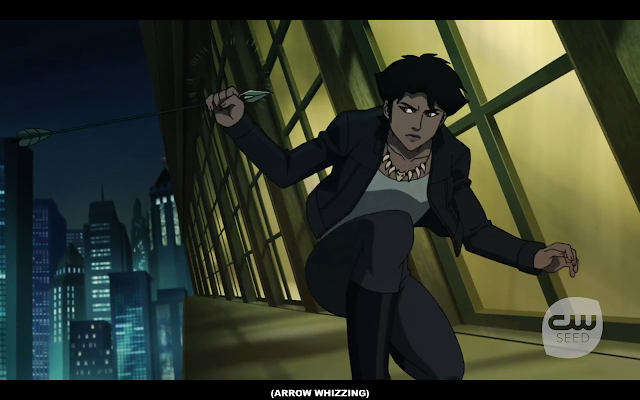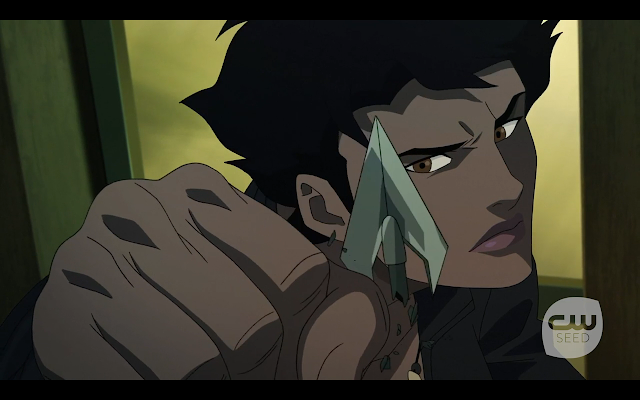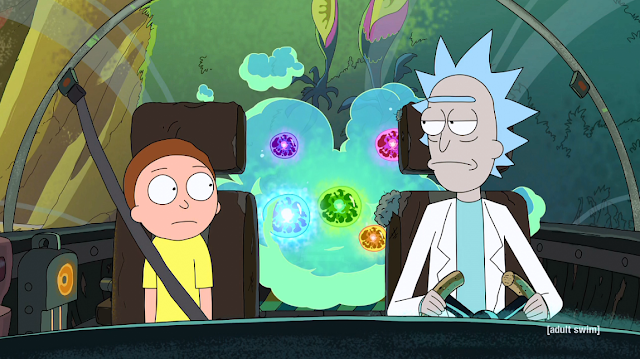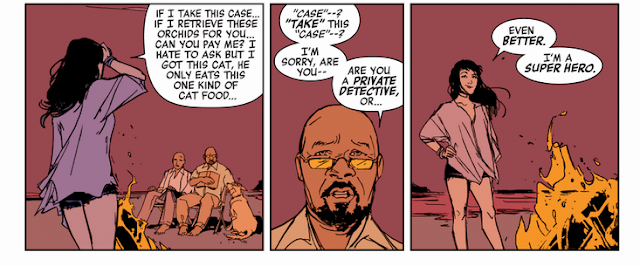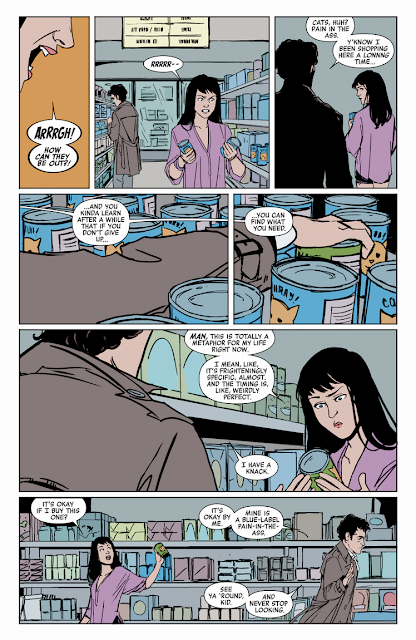Occasionally on Friday, I discuss the week's best first-run animated series episode I saw. It's the "Brokedown Merry-Go-Round" Show of the Week. "Brokedown Merry-Go-Round," a two-hour block of original score tracks from animated shows or movies, airs weekdays at 2pm Pacific on AFOS.
At only five minutes per weekly episode, the six-part CW Seed miniseries Vixen, an animated reintroduction of a black DC Comics heroine who previously appeared in animated, Gina Torres-voiced form on Bruce Timm's beloved Justice League Unlimited, is hilariously short. I expected Chris Rock to channel his old SNL character Nat X and joke about how a black superhero can only get a five-minute webtoon because the Man won't give her a two-hour movie. So I was surprised to discover that Rock has been raving about Vixen.
The best superhero I've seen all summer is #vixen http://t.co/MV9C7fmgAu @megalyn pic.twitter.com/8MMqJKJAKJ
— Chris Rock (@chrisrock) August 25, 2015
In a summer that's consisted of Avengers: Age of Ultron and Ant-Man on the big screen (we'll just forget the whole Fantastic Four fiasco, and, oh, by the way, the only Fantastic Four that matters is these guys), that's huge praise for a superhero webtoon. So is Vixen--which takes place in the Arrow/The Flash/Legends of Tomorrow shared universe and will feature the voices of Arrow stars Stephen Amell and Emily Bett Rickards and Flash stars Grant Gustin and Carlos Valdes in upcoming episodes--as terrific as Rock implies? Animation-wise: yes. Storytelling-wise: it's too early--and too short--to tell. So far, I'm not in love with the presence of the ubiquitous in medias res device--an old storytelling favorite of the Arrow writers, who also scripted Vixen--and the clunky-sounding exposition during a diner conversation between aspiring Detroit fashion designer Mari McCabe (Megalyn Echikunwoke), who's about to discover that a family heirloom she's been wearing can grant her the power to mimic the abilities of animals, and her white foster dad Chuck (Neil Flynn, a.k.a. the dad on The Middle) in this first episode.
My least favorite aspect of Greg Weisman and Brandon Vietti's now-defunct DC Animation show Young Justice comes back to haunt this new DC Animation project. Early on in one episode of Young Justice, Miss Martian was seen explaining to a skeptical and typically monosyllabic Superboy why she used her shape-shifting powers to disguise themselves as her uncle J'onn J'onnz and Superman at a press conference that just took place, more for the sake of bringing the audience up to speed than for her ex-boyfriend's sake. "Conner, you know we have to maintain the illusion that Superman, Manhunter and the other Leaguers who went into space are still on Earth. We can't let our enemies know how short-handed the Justice League is right now," she said to Superboy, who, in addition to being miserable about his life as a teenage clone of both Superman and Lex Luthor, has to go to work each day with a pro-torture ex-girlfriend who's fond of speaking in IMDb plot summary-ese.
Arrow veterans Wendy Mericle, Keto Shimizu and Brian Ford Sullivan (all paired up with Lauren Certo, who co-wrote another Arrow-related webseries, the live-action Blood Rush) are a little more skilled at handling exposition than Weisman and Vietti because of the experience they've had writing dialogue for a live-action prime-time show that can't really get away with that type of Saturday morning cartoon exposition too often. So Vixen is slightly more cognizant than Young Justice about how people who know each other well actually talk to each other and is a little less ridiculous and awkward about the exposition--we learn Mari is looking for her birth parents, the difficulties of finding the fashion design job she wants have left her with an understandable temper and she's closer to Patty, an absent and most likely ailing member of Mari's foster family who's presumably Chuck's wife (and will be voiced by Kari Wuhrer), than she is to Chuck--but much of it is still unnatural-sounding expository dialogue. The opening action sequence is much closer to what I want out of an animated sister show to Arrow, The Flash and the forthcoming Legends of Tomorrow, and that would be nicely staged action that's full of visuals an animated show can pull off with more panache than a live-action one, with minimal dialogue during the action. But that rooftop sequence in which Mari outwits the Arrow (Amell) and outraces the Flash (Gustin)--only to accidentally slip and fall--actually goes one better by containing no dialogue at all. It's a wise stylistic choice by both the Arrow writers and miniseries director James Tucker, who previously directed the 2013 DC Animation movie Superman Unbound and showran Batman: The Brave and the Bold, the surprisingly good DC Animation show that proved a light-hearted take on modern-day Batman doesn't have to suck like a Joel Schumacher Batman movie.
The effective animation for Mari's escape from Oliver Queen and Barry Allen, a sequence in which miniseries co-composer Blake Neely gets to restate his main themes from Arrow and The Flash, is mainly what earns the Vixen premiere episode the "Brokedown Merry-Go-Round" Show of the Week title. But there are a couple of extra touches that elevate Vixen and will make it worth following on CW Seed in the next few weeks.
The show's dialogue recording team is clearly made up of fans of Fantastic Mr. Fox, which was distinctive for having its vocal cast record their dialogue outside the recording booth and outdoors in order to make their stop-motion-animated movie sound naturalistic. I'm not sure if the Vixen sound team actually did venture outside the booth to record Mari's reverby scene in jail, her diner scene with Chuck and an upcoming S.T.A.R. Labs scene between Barry and Valdes' lab tech character Cisco that was included in the series premiere trailer, but the Fantastic Mr. Fox approach to getting Mari and the other characters to sound like they're actually in reverby and chilly rooms gives this DC Animation project an interestingly grounded feel and makes it a seamless part of the live-action Arrow/Flashverse.
Oh yeah, and there's the simple fact that Mari is the first female superpowered hero of color in the Arrow/Flashverse (Katana, a heroic swordswoman played on Arrow last season by Rila Fukushima, doesn't have any powers). The character is an appealing middle ground between the fantasy-based heroism of the supers on The Flash and the more flawed (and non-superpowered) heroism of the street-level crimefighters on Arrow (the time frame of the miniseries begins with Mari in jail for self-defense, and the episode implies that the man she attacked was such a disgusting perv that she didn't deserve to be put behind bars).
I'm curious to see how Echikunwoke--whom I remember from her eye-candy roles on The 4400 and House of Lies and is an ideal choice to play Mari if she becomes a live-action character--will tackle both voice acting, especially in a setting that's way more family-friendly than House of Lies (but still salty in the dialogue department, in a CW kind of way, of course), and a heroic character who, like Static from DC's Milestone imprint, clearly means a lot to African American DC readers. So far, the premiere episode has shown that Echikunwoke is a great screamer. I never read the Justice League Detroit comics. I don't think Vixen screams like Mel from Doctor Who in those comics.
I'm also curious to see how Vixen will handle what's essentially a story about a black adoptee raised by white parents (she appears to be embarrassed about it)--and in search of both her heritage and her purpose in life--that happens to be dressed up in superhero genre garb. Will it handle that kind of story with the same kind of aplomb Penny Dreadful has demonstrated as a story about identity that's dressed up as a Gothic horror drama? Or will it drop the ball like 2011's Green Lantern, which Arrow creators and Vixen co-executive producers Marc Guggenheim and Greg Berlanti both co-wrote, and turn into another unimaginative--and emotionally flat--daddy issues-driven origin story?
Chris Rock's praise of this webtoon's premiere episode, as well as Flash cast member Candice Patton's similar endorsement of it--even though she's not in Vixen and she didn't get to reprise her role as Iris West--and black viewers' interest in it on Twitter, all remind me of when I was involved in the creation of a similar female superhero of color for an indie graphic novel about Asian American superheroes. I noticed a glint of excitement in the eyes of both male and female Asian American readers who were fans of that novel back in 2009. It was a glint that said, "I've been hungry for this my whole life."
I'm unable to glimpse that same glint on people from Black Twitter for obvious reasons, but judging from Vixen viewers' #DatTotem hashtag and enthusiastic tweets from the likes of BlackGirlNerds and the hosts of The Fan Bros Show, that glint is definitely there in their writing. Everyone's getting tired of superhero movies starring white guys named Chris. There needs to be more Chrisiquas and Cristinas up in this piece.
Times are changing, and the increasingly inclusive Arrow/Flashverse appears to be responding to the frustrations younger viewers have expressed about the presence of underrepresented groups on the screen, but it's responding in mostly sensible--and now with the arrival of Vixen, fascinating--ways. For instance, on The Flash, the police captain isn't an old, pasty Irish guy like it always used to be on cop shows and superhero shows before the '90s (neither is the captain some African American authority figure with no inner life). He's a younger and openly gay Indian Canadian guy. And now the Arrow/Flashverse is boldly placing a black woman at the center of the action instead of behind the action like spymaster Amanda Waller or on the sidelines like Iris. The five-minute webtoon format may make Vixen seem like a small step towards progress, but this step's a big one.




